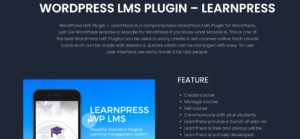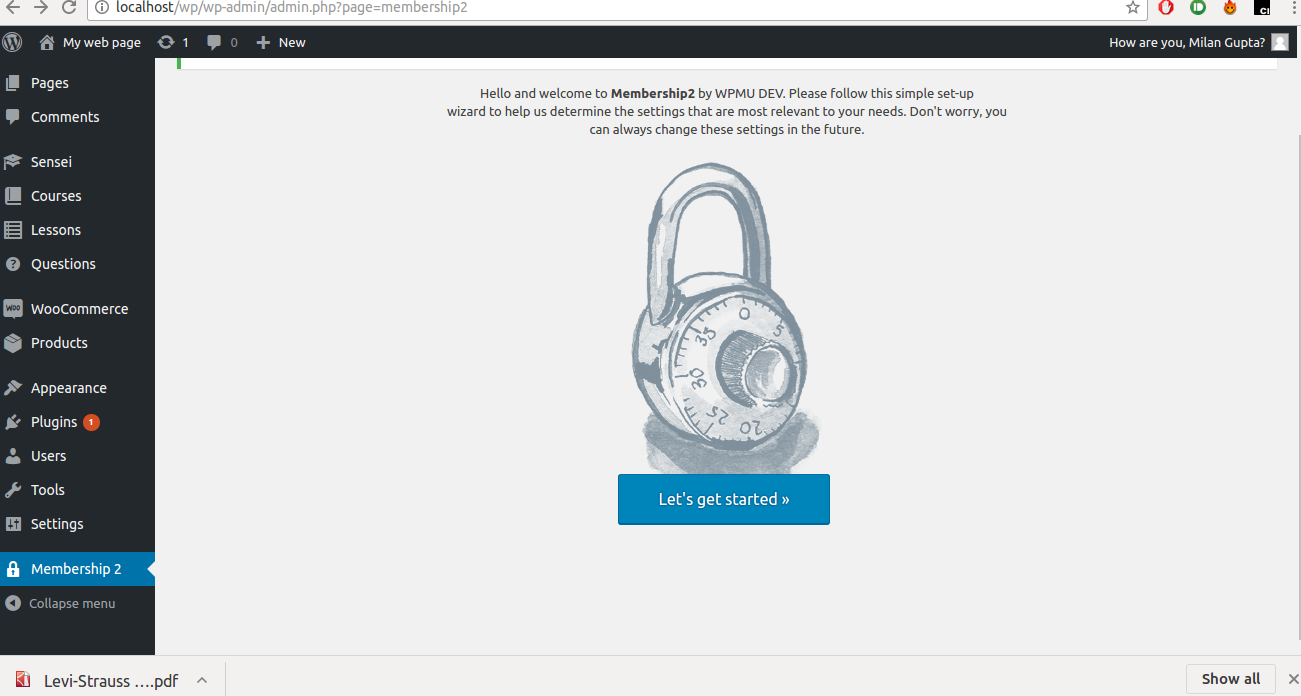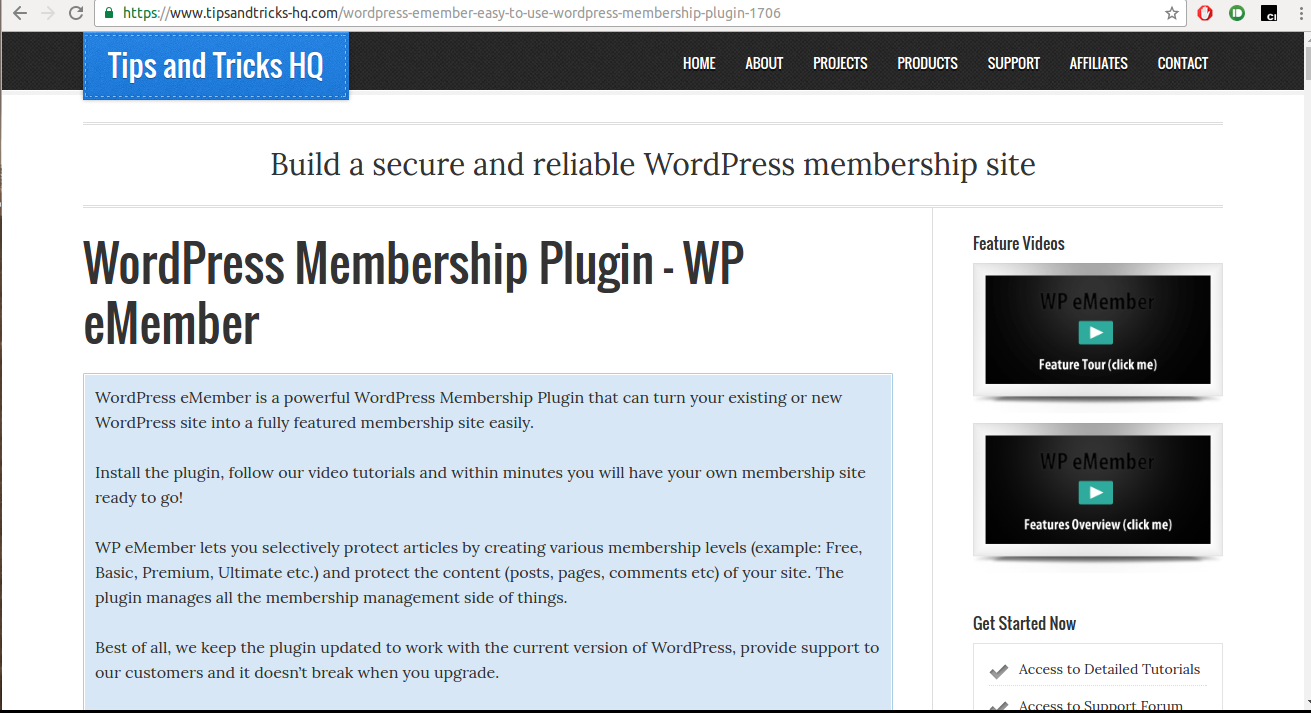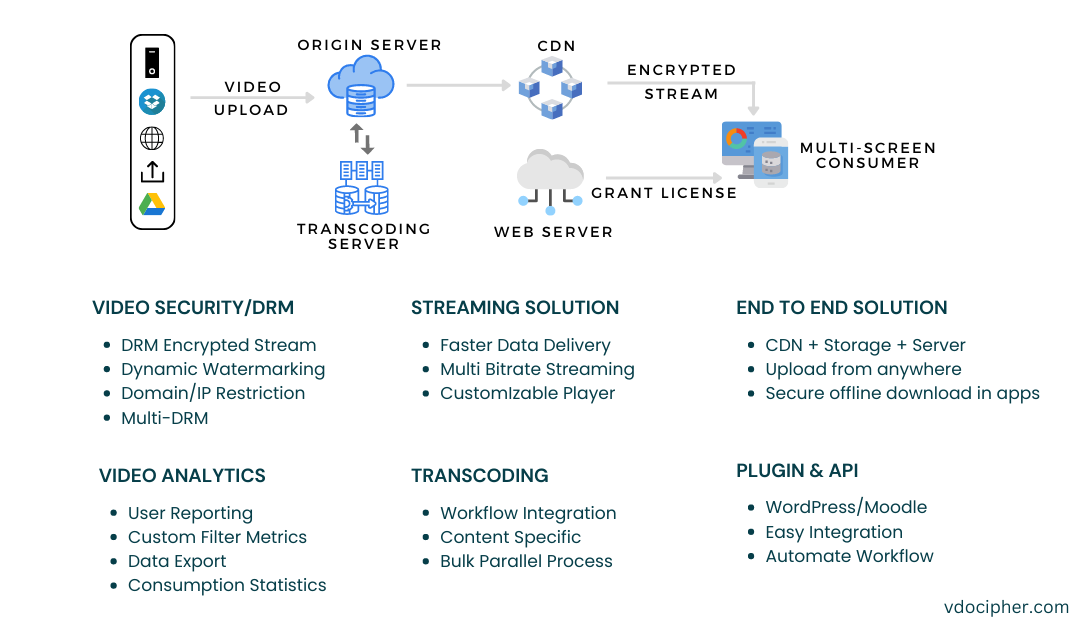Starting out with creating your WordPress online course, but confused about which plugins for E-Learning to choose from?
Not sure which functionalities are necessary and which functionalities are optional?
In this blog post, I walk you through the most essential WordPress plugins for E-Learning course developers to choose from which will further help you develop a custom WordPress website at its best.
Table Of Content:
What are WordPress Plugins?
A WordPress plugin is a small add-on software to extend the functionalities and features of a WordPress platform. Apart from this, plugins enable adding all these functionalities without writing any code. The WordPress.org plugin directory has over 50,000 free plugins, many of which are by third-party developers.
For example, there are WordPress plugins to add a share button to your website or modify your contact form. To do so, plugins use access points, otherwise known as filter and hook actions. These are provided by the WordPress plugin API to ‘hook into’ the source code. At specific times, these methods and access points call the functions of the plugin to make modifications.
How to Install a WordPress Plugin
- Go to your WordPress dashboard and go to the ‘Plugins’ section. Search for the required plugin on the ‘Add Plugins’ page.
- Once selected, click ‘Install Now’
- Next, click ‘Activate’ to configure the installed WordPress plugin.
First I proceed with how you should evaluate your requirements in designing the course
Features of Learning Management System (LMS) plugins for E-Learning
The most significant features that an LMS must-have is for you to be able to:
- Give learner flexibility to pace their course as per their wish – a self-paced course
- What-You-See-Is-What-You-Get Interface, to put minimum effort into using the interface
- Making a complete course catalog, so that all the course information is collected at one location
- Automated User Enrolment and Status, of course, progress – completion status
- Course Reports for course creator to review how a course is progressing
- Learner feedback – Course Surveys and System Announcements – These are essential for the instructor to continually improve the learning experience
- Learner’s access to course transcript and course progress – Learners should have knowledge about their course progress as well
- Learner access to changing profile
Apart from these, there are a number of other features that you may wish for, which would include
- Creating multiple course levels – so that there may be content-lite and content-heavy memberships
- Creating certificates of completion for learners that complete their course – certificates are a strong motivation for learners, as they provide tangible proof of the skills learned
- Automating user access control – Restricting access to content and granting access to content depending on user level
- Generating course and user reports for course administrator
- Creating dripped content for controlling user progress in course – To control the rate at which learner accesses the course, create dripped content tool
Explore More ✅
With VdoCipher, integrating top-tier DRM protection into your WordPress site is straightforward. Click to explore the easy integration and keep your videos safe from piracy.
Why Do You Need a WordPress Plugin for E-Learning?
Using WordPress plugins for e-learning is essential because they provide specialized features and functionalities to create, manage, and enhance online learning experiences. Here’s why incorporating an e-learning plugin into your WordPress site is crucial:
1. Transform Your Website into a Learning Management System (LMS)
WordPress is primarily a content management system (CMS), not an LMS. While it is great for managing and publishing content, it doesn’t have the built-in functionalities needed to create and manage online courses, quizzes, student enrollments, and certifications. E-learning plugins add these necessary LMS features to WordPress, transforming a standard website into a comprehensive e-learning platform.
2. Create and Manage Courses with Ease
E-learning plugins provide a user-friendly interface for creating and organizing courses, lessons, modules, and quizzes. They often come with drag-and-drop course builders that allow you to design courses without any coding knowledge. This convenience allows educators and course creators to focus on content delivery rather than technical aspects.
3. Facilitate Online Assessments and Quizzes
Assessment is a critical part of any educational experience. E-learning plugins offer advanced quiz and assignment features, allowing you to create various question types (multiple choice, true/false, matching, etc.), set time limits, randomize questions, and provide instant feedback. This capability is essential for evaluating students’ understanding and progress.
4. Monetize Your Courses Effectively
If you plan to sell courses online, e-learning plugins provide various monetization options, such as one-time payments, subscriptions, memberships, and course bundles. They integrate with popular payment gateways like PayPal, Stripe, and WooCommerce, making it easy to collect payments securely. These features help maximize revenue opportunities while keeping the transaction process smooth for both the seller and the buyer.
5. Improve Student Engagement and Retention
Engaging students in an online environment can be challenging. E-learning plugins come with tools to enhance engagement, such as gamification elements (badges, certificates, points), discussion forums, and social learning features. They also support drip content, where lessons are released on a scheduled basis, helping to keep students consistently engaged over time.
6. Manage Learners and Track Progress
E-learning plugins provide robust learner management features, such as student registration, enrollment, user roles, and progress tracking. They allow instructors to monitor individual student progress, track course completion rates, and provide personalized feedback. These tools help create a structured learning environment and ensure that students stay on track.
7. Optimize Learning for Different Devices
Most e-learning plugins are mobile-responsive, ensuring that your courses are accessible across various devices, including desktops, tablets, and smartphones. This flexibility allows learners to access content from anywhere, at any time, increasing the accessibility and reach of your courses.
8. Customize and Extend Functionality
With WordPress plugins, you have the flexibility to customize and extend functionalities according to your needs. Whether you need to integrate with a specific tool (like CRM or email marketing software), add advanced analytics, or use custom themes to match your branding, e-learning plugins provide the necessary hooks and extensions to adapt the platform to your specific requirements.
9. Save Time and Reduce Costs
Building a custom e-learning platform from scratch is time-consuming and expensive. E-learning plugins offer a cost-effective solution that leverages WordPress’s existing infrastructure, reducing development time and costs. With plugins, you can get your e-learning platform up and running quickly, often with minimal setup.
10. Enhance Security and Compliance
Many e-learning plugins come with features to protect your content, such as Digital Rights Management (DRM) for videos, content restriction, and secure payment processing. They also help ensure compliance with regulations like GDPR by providing tools to manage user data and consent.
11. Leverage SEO and Marketing Tools
WordPress is well-known for its SEO capabilities, and e-learning plugins integrate smoothly with SEO plugins like Yoast SEO or Rank Math. This helps your courses rank better on search engines, driving organic traffic to your site. Additionally, e-learning plugins often include marketing tools to promote courses through email campaigns, social media sharing, and affiliate programs.
How to Choose the Right WordPress Plugin for E-Learning
Selecting the right WordPress plugin for e-learning is crucial for building a successful online education platform. The choice depends on several factors, including your specific needs, budget, technical expertise, and long-term goals. Here’s a step-by-step guide to help you choose the most suitable e-learning plugin for your WordPress website:
1. Define Your E-Learning Requirements
Before you start looking for a plugin, outline your specific requirements and goals. Consider the following:
- Type of Courses: Are you offering self-paced courses, live classes, or a combination of both?
- Course Features: Do you need quizzes, assignments, certificates, drip content, or gamification?
- Student Management: Will you manage individual learners, groups, or cohorts? Do you need advanced reporting and analytics?
- Monetization Options: Do you plan to offer free courses, sell courses, provide memberships, or bundles?
- Integrations: Do you need integration with specific tools like CRMs, email marketing platforms, payment gateways, or video hosting services? Understanding your requirements will help you narrow down the plugins that match your needs.
2. Evaluate Key Features
Different plugins offer varying features. Prioritize the features that are most important for your platform:
- Course Creation Tools: Look for a plugin with a user-friendly course builder, preferably with drag-and-drop functionality. It should allow you to create multimedia lessons, quizzes, assignments, and certificates.
- Student Engagement Features: Plugins with gamification, discussion forums, social learning, and progress tracking tools can significantly enhance student engagement.
- Monetization Capabilities: Ensure the plugin supports your preferred payment methods and monetization strategies, like one-time payments, subscriptions, or memberships.
- Content Protection: Choose a plugin that offers robust content protection features, such as DRM for videos, secure logins, and restricted access.
3. Consider Ease of Use and Flexibility
The plugin should be easy to set up and use, even for non-technical users:
- User Interface: Opt for a plugin with an intuitive and well-designed user interface for both administrators and students.
- Customization: The plugin should allow you to customize course layouts, user roles, emails, and notifications to fit your branding and requirements.
- Compatibility: Ensure the plugin is compatible with your WordPress theme and other essential plugins on your website.
4. Check for Scalability
Think long-term and choose a plugin that can grow with your needs:
- Multiple Instructors: If you plan to have multiple instructors, ensure the plugin supports multi-instructor functionality.
- Unlimited Courses and Users: Choose a plugin that allows for unlimited courses and users, so you don’t face limitations as your platform grows.
- Advanced Reporting: Look for robust reporting features that offer insights into student progress, course completion rates, and overall engagement.
5. Review Plugin Integrations
Check if the plugin integrates seamlessly with other tools you use or plan to use:
- Payment Gateways: Look for integrations with major payment gateways like PayPal, Stripe, or WooCommerce.
- Marketing Tools: Ensure compatibility with email marketing tools (like Mailchimp), CRM systems, and analytics platforms (like Google Analytics).
- Video Hosting Services: For video-based courses, verify that the plugin integrates with secure video hosting services (like VdoCipher) to prevent piracy and unauthorized access.
6. Evaluate Performance and Speed
E-learning platforms can become slow due to the heavy content (like videos) they host. Ensure the plugin does not negatively impact your website’s performance:
- Optimized Code: Check if the plugin is built with optimized code that ensures fast loading times.
- Caching and CDN Support: Look for plugins that support caching and Content Delivery Networks (CDNs) to improve site speed.
7. Read Reviews and Case Studies
User reviews and case studies provide insights into how well a plugin performs in real-world scenarios:
- Customer Feedback: Read reviews on WordPress.org, third-party review sites, or social media platforms to understand the experiences of other users.
- Case Studies: Look for case studies or testimonials on the plugin’s website to see how it has helped similar businesses or educators achieve their goals.
8. Test the Plugin’s Demo or Free Version
Most e-learning plugins offer a demo or a free version:
- Try Before You Buy: Test the demo or free version to evaluate its user interface, features, and ease of use.
- Check Support and Documentation: Explore the available documentation, video tutorials, and customer support options to ensure you’ll have help when needed.
9. Consider Cost and Licensing
The cost of a plugin is an important factor, especially if you have a tight budget:
- Pricing Models: Compare pricing models – some plugins are one-time purchases, while others use a subscription model.
- Add-ons and Extensions: Be aware of additional costs for add-ons or premium features that may be necessary for your needs.
- Support and Updates: Make sure the cost includes access to updates and customer support, as these are vital for security and compatibility.
10. Ensure Ongoing Support and Updates
WordPress Plugins for eLearningis a long-term investment, so choose one that is actively maintained and regularly updated:
- Developer Reputation: Research the plugin developers to ensure they have a good reputation for maintaining and updating their products.
- Support Availability: Check the support channels available – email, chat, forums – and see how responsive they are to customer inquiries.
Security & Content Protection
When you run an eLearning website, your content is your biggest asset. You’ve spent time and effort creating premium courses, so it’s important to make sure they don’t end up being copied, shared, or pirated without your permission. If your videos or course materials get leaked, not only do you lose revenue, but it also discourages learners who pay honestly.
Importance of Protecting Premium Course Content
Think of your courses like a paid book or a Netflix subscription. If anyone could just copy and share it freely, would people still buy it? Probably not. Protecting your course content ensures that your hard work stays valuable, and your learners continue to get a fair, professional learning experience.
Role of DRM-Enabled Video Hosting (like VdoCipher)
This is where DRM (Digital Rights Management) comes in. DRM-enabled video hosting platforms such as VdoCipher act like a digital lock for your videos. They encrypt your video files so that even if someone tries to download or copy them, the file won’t play outside the secure environment. Platforms like VdoCipher also block common piracy tricks like link sharing or using download managers.
In short: you can stream videos smoothly to your students, while keeping hackers and pirates out.
Preventing Screen Recording, Downloads, and Piracy
While no system is 100% foolproof, DRM hosting combined with smart security measures makes piracy very difficult. Features like:
-
Blocking screen recorders on devices
-
Dynamic watermarking (showing the user’s ID or email on screen)
-
Restricting playback to certain IPs, locations, or devices
all help reduce unauthorized sharing.
So even if someone tries to record your content, you’ll know exactly who it was and can take quick action.
Best Practices for Secure Course Delivery
Beyond DRM, here are some smart practices you can follow:
-
Use strong passwords and avoid sharing admin accounts.
-
Limit the number of devices per student account.
-
Keep your plugins, themes, and WordPress version updated.
-
Integrate with a secure payment gateway to avoid fraud.
-
Combine your LMS with a trusted video hosting solution rather than free or public platforms like YouTube.
By mixing the right tools with good security habits, you’ll not only protect your content but also build trust with your learners. They’ll feel reassured knowing they’re part of a professional, secure learning platform.
Top 10 WordPress Plugins for eLearning
LifterLMS

LifterLMS is another lightweight E-Learning solution, that is very easy to use. Key features include:
- Integration with WooCommerce and BuddyPress support
- Support for certificates
- Supports both Stripe and PayPal
- Supports course scheduling and prerequisites
For a detailed review of Free LMS plugins for WordPress check out this blog on Free LMS Plugins
LearnDash
Learndash specializes in E-Learning solutions, meaning that they have developed their WordPress LMS plugin for E-Learning keeping in mind any features that an education LMS must require.
SCORM is a collection of standards for E-Learning, which state how the LMS must package user learning content. SCORM standards ensure portability of learner information across different LMS. Tin Can API has now replaced SCORM as the new standard for educational content designed in a portable way. Learndash supports Tin Can API plugin.
Learndash have tried to make a complete marketing and product solution- they have their own membership solution, and have an integrated payment processing setup. The flip side of being an all-in-one solution is that this do not allow much scope for customization. On the other hand they have an active community support forum.
Essentially Learndash is optimal for developing detailed and academic-level E-Learning solutions, where little customization is required.
LearnPress
LearnPress is offered as a free plugin and includes both free features and premium add-ons.
- Course Builder: User-friendly course creation tool with support for lessons, quizzes, and sections.
- Payment Integration: Supports PayPal, Stripe, and WooCommerce for selling courses.
- Quizzes and Grading: Create customizable quizzes with various question types and automated grading.
- Student Management: Track student progress, enrollments, and performance in one place.
- Content Drip: Control the release of lessons over time to pace learning.
- Add-on Support: Extensive add-ons for certifications, memberships, and more for expanding functionality.
Premium add-ons apply for:
- Gamifying the course – adding points for learner activity
- Generating certificate
- For Integration with WooCommerce, PayPal and Stripe
- Integrating with Membership 2 Pro
MemberPress
MemberPress is a popular community development + LMS plugin for wordpress. The LMS plugin with course and student management features is paid and the plan starts from $179/year (as of Oct 2024).
Here are the top 7 features of the MemberPress plugin:
- Membership Management: Easily create and manage multiple membership levels with different pricing plans.
- Courses: Built-in LMS for creating and selling courses with quizzes and progress tracking.
- Content Access Control: Restrict access to content and drip-feed it over time or set expiration rules.
- Payment Integration: Supports popular gateways like PayPal, Stripe, and Authorize.Net with recurring billing.
- Subscription Management: Automatically handle renewals, upgrades, and downgrades for members.
- Reports & Analytics: Detailed reporting on membership sales, revenue, and user activity.
- Integrations: Seamless compatibility with email marketing tools, WooCommerce, and LMS platforms like LearnDash.
MasterStudy
MasterStudy is a popular company with multiple plugins for wordpress including Stylemix theme + Master Study LMS plugin. The plugin has both free and paid versions.
Here are the top 7 features of the MemberPress plugin:
- Course Builder: Intuitive drag-and-drop course builder to create lessons, quizzes, and assignments easily.
- Monetization Options: Sell courses through various pricing models (one-time payment, subscription, or membership).
- Quizzes and Assessments: Create diverse quizzes with multiple question types, timers, and pass marks.
- Drip Content: Schedule the release of course materials over time to manage learning progress.
- Student Management: Track student progress, provide grades, and offer certificates upon course completion.
- Integrations: Integrates with payment gateways like PayPal, Stripe, and supports Zoom for live lessons.
WP CourseWare
WP Courseware is a lightweight WordPress plugin to embed videos in WordPress for E-Learning, whose strong point is that it integrates fairly easily with other WP Plugins. Likewise with this WordPress plugin you get a large varieties of customization options. An important plugin that WP CourseWare can integrate with is Membership Pro, which is the most popular membership WordPress plugin.
WooCommerce Sensei
Sensei comes from the stable of WooCommerce, who are experts in developing eCommerce WordPress Plugins. Sensei is priced at $129 for a single-site license. This WordPress plugin for E-Learning is a simple and effective interface for making courses, as the course, module, lesson and quiz sections can all be created with a lot of ease. The interface is essentially What-You-See-is-What-You-Get. Because of its compatibility with all WooCommerce plugins, and because of an interface that gets most things done easily and quickly, Sensei is our top-rated Learning Management System plugin.
Membership WordPress Plugins – These plugins help WordPress websites to manage and create subscription-paid content or courses with additional features. Some common features include user registration and login, content protection, membership management, analytics, and payment gateway integration.
Membership 2
Membership 2 is the most widely used membership WordPress plugin. This is a free software, but has a paid pro version that offers added features.
Membership 2 is designed for ease-of-use for the beginner. It has a how-to guide to get you started with creating the course. Also Content access control and protection is made very easy with this plugin – for each lesson/ course you create you can select which membership levels to grant access to. Also Dripped content management is made very easy, and can be done on the same interface as the content protection. This makes managing your course much less complicated.
The pro version of Membership 2 integrates with both PayPal and Stripe payment solutions
WP eMember
Where Membership Pro relies on an easy-to-use interface and a free introductory membership plugin, WP eMember offers a robust membership WordPress plugin that offers both content protection and a large number of additional features, making this a great option for anyone looking for a complete WordPress membership plugin.
Using this wordpress plugin, it is easy to create multiple membership levels, and to grant differential access for different membership levels. Also in-page partial protection is available via easy to use shortcodes. Additional options include options to limit user access to minimize password sharing – effectively minimizing content piracy. Also there is support for Drip Content, which limits access to users based on their drip learning schedule.
eCommerce WordPress Plugins
eCommerce plugins can come quite handy for you in managing your course inventory, if you are selling multiple courses. An eCommerce plugin is not necessary for the new E-Learning developer, but if you wish to manage multiple courses, an integrated eCommerce plugin can come in quite handy for managing inventory.
WooCommerce
WooCommerce wordpress plugin offers hundreds of extensions and themes, that make it quite easy to available for WooCommerce, which makes it easy to add new features to your eLearning site. Besides eLearning, anyone can easily integrate WooCommerce with many top-rated platform for writing blogs or sell products, such as WooCommerce Amazon Integration which is considered as one the best integration for growing business. If you have worked on WordPress previously and are comfortable with the technical details of using WordPress, this WordPress Plugin is the best eCommerce solution for you.
Shopify

Shopify has a very easy interface, and is great for beginners who do not wish to go into technical details of using WP. It has a monthly subscription fees, but is worthwhile to use because of its hassle-free interface which allows you to get on with developing your course content without worrying about the technicalities. This WordPress plugin works with social networks such as Facebook Store, Buyable Pins and Twitter Buy buttons
VdoCipher – Best WordPress Video Plugin for Elearning videos
Content security and smooth streaming are two integral features that any WordPress video hosting plugin for eLearning must offer. VdoCipher offers an easy-to-use shortcode and is a complete video hosting solution. In VdoCipher one-time access is only granted to a fully encrypted stream after backend authentication from the host website, meaning that video security is maximized. VdoCipher has a 10 min install ready-to-go live plugin for all e-learning video WordPress sites. VdoCipher is your best bet for your WordPress video plugin.
We’ve written several other blogs on LMS, feel free to check them out if it piques your interest
FAQs
How to check if a plugin is compatible with my WordPress version?
When you search for the plugin on the WordPress repository and if it is compatible with your version, you will see, Compatible with your version of WordPress.
Is using WordPress plugins safe?
Yes until you download it from a trusted source, check its ratings and customer reviews, and keep it up-to-date.
What features to look for in a WordPress membership plugin?
Check for the features you require like security, membership levels, integrations, and payment gateways. It should be compatible with your version of WordPress and easy to use and install.
Supercharge Your Business with Videos
At VdoCipher we maintain the strongest content protection for videos. We also deliver the best viewer experience with brand friendly customisations. We'd love to hear from you, and help boost your video streaming business.








 Kristina says
Kristina says
November 20, 2024 at 6:02 amTools that incorporate gamification make learning feel less like a chore and more like an adventure.
 Gpl bot says
Gpl bot says
August 1, 2025 at 9:21 amYour content was not just informative, but incredibly insightful — it reflects a deep understanding of WordPress membership solutions. The way you explained the plugin’s features, step-by-step configuration, and use cases was clear and easy to follow, even for beginners.I also explored your implementation on the site, and it’s seamless the member login flow, content access levels, and overall user experience are super impressive. Thank you for sharing such valuable knowledge — I’m definitely bookmarking your site. Keep up the great work!